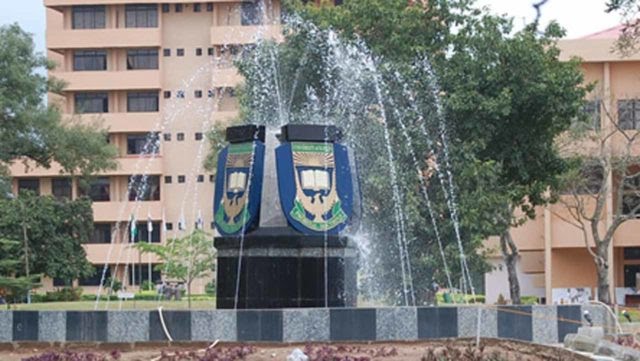Education
Over 880 candidates failed final bar examination – DG

Over 880 candidates failed final bar examination – DG
The Nigerian Law School DG has said that a total of 888 candidates failed the final bar examination conducted in November 2023.
The School Director-General, Prof Isa Hayatu Chiroma, said out of the total number of 5,300 candidates that sat for the final examination, only 4,412 were successful, with 251 candidates achieving first class.
The DG made this known at the call-to-bar ceremony held in Abuja on Tuesday, noting that, “I will be presenting at this call-to-the Bar ceremony a total of 4,412 candidates who were successful at the November 2023 bar final examinations, as well as 14 candidates from previous bar final examinations.
“I am happy to report on the good performance recorded by the candidates, as seen in the Executive Summary below: Outstanding/General Performance
“(a) Total number of students who participated in the examinations: 5,300.
“(b) Total number of successful candidates: 4,412
“(c) The Nigerian Law School is proudly happy to report that a total number of 251 candidates bagged a first-class grade in the last bar final examination. This is indeed an outstanding, excellent performance and, of course, unprecedented.
“(d) These figures translate to 83.3% success at the bar final examinations,” he said.
The chairman of the Body of Benchers, a retired Justice of the Supreme Court, Mary Peter-Odili, described the current period as bad for the judiciary, adding that confidence in the judiciary was dwindling due to the spate of conflicting judgments and indiscipline among lawyers.
READ ALSO:
- Gaza: Stop double standard, Nigeria govt tells World
- ‘Any man who touches you will die’, Israel DMW curses estranged wife
- (UPDATED) EFCC, Customs intercept 22 trucks exporting food to Chad, Cameroon, Benin (Photos)
She said, “It is a bad period in the sense that the judiciary is being bashed and public confidence in the legal system is dwindling, occasioned by incessant conflicting judgments in our courts and flagrant indiscipline amongst lawyers.”
According to her, the Body of Benchers had set up a committee to address the issue of conflicting judgments.
“In a bid to address this vexed issue of conflicting judgments, the Body of Benchers constituted a committee made up of ranking members of the profession.
“The committee will come up with the best possible ways of addressing the concerns.
“When the Committee completes its assignment and presents its report to the Body of Benchers; it will, upon consideration and approval, be forwarded to the relevant bodies for implementation,” she stated.
She urged the new lawyers to avoid all forms of corruption as well as conduct that could tarnish the image of the judiciary.
Peter-Odili said, “You have been called to the bar in a very important historic period in the legal profession in Nigeria; a period when the good, the bad, and the ugly are all operating at the same time.
“The good, to the extent that the Supreme Court now has the full complement of justices required to man the court.
“The good, to the extent that the welfare of judicial officers is being taken seriously and the Body of Benchers, alongside other relevant bodies, is championing the process.
“I have read in the papers about the increased funding of the judiciary, which is a positive development. I hope it will be backed by adequate release of funds as and when due,” she said.
Among the new wigs were a former Governor of Rivers State and immediate past Minister of Transportation, Chief Rotimi Amaechi.
Over 880 candidates failed final bar examination – DG
Education
Check Your Name: UNILORIN Releases Updated NELFUND Refund List for 2024/2025 Students

Check Your Name: UNILORIN Releases Updated NELFUND Refund List for 2024/2025 Students
The University of Ilorin (UNILORIN) has released a new list of students eligible to apply for the 2024/2025 NELFUND refund, according to the UNILORIN Students’ Union (SU). Students who paid school fees before NELFUND disbursed funds directly to the university are now required to check their names and submit refund requests through the proper channels.
The official refund eligibility list has been shared in an Excel spreadsheet format and contains verified student details, including full name, matriculation number, department, and eligibility status. Students can search the file using their name or matric number to confirm their eligibility.
Those whose names appear on the list are instructed to fill the official refund form and submit supporting documents, including fee receipts and bank account details, to the Student Affairs Unit (SAU) or their respective Dean’s Office. The refund disbursement is gradual and ongoing, depending on NELFUND fund release schedules.
READ ALSO:
- Argungu Festival 2026 Highlights Peace, Stability, Economic Growth — Tinubu
- US Military Boosts Support for Nigeria’s Fight Against Insurgency With Ammunition, Troop
- Afenifere Calls for Immediate Take-Off of State Police as Terror Threats Rise in Yorubaland
For students whose names are not on the current list, they are advised to check their NELFUND portal status at portal.nelf.gov.ng and ensure all records are correctly verified. UNILORIN and the Students’ Union have also clarified that this is not the final list, as additional batches of eligible students may be added as verification continues.
Students are urged to act promptly, as following the prescribed procedures will ensure timely refund of fees paid in advance.
How to Check Your Eligibility
Students can confirm their eligibility by viewing the official list published by the university. To streamline verification, a table of students in the Department of Accounting and select departments is presented below.
| S/N | Matric Number | Student Name | Programme | Level | Department |
|---|---|---|---|---|---|
| 1 | 20/66MA093 | Johnson Babatunde Ogunwunmiju | B.Sc. Accounting | 400 | Accounting |
| 2 | 21/66MA002 | Zainab Oreoluwa Abdulrahmon | B.Sc. Accounting | 400 | Accounting |
| 3 | 21/66MA021 | Shukurat Oluwapelumi Adetunji | B.Sc. Accounting | 400 | Accounting |
| 4 | 21/66MA038 | Josephine Oluwateniola Akoki | B.Sc. Accounting | 400 | Accounting |
| 5 | 21/66MA049 | Vivian Member Aun | B.Sc. Accounting | 400 | Accounting |
| 6 | 21/66MA054 | Yusuf Olamilekan Babatunde | B.Sc. Accounting | 400 | Accounting |
| 7 | 21/66MA065 | Precious John Elijah | B.Sc. Accounting | 400 | Accounting |
| 8 | 21/66MA083 | Mariam Omowunmi Issa | B.Sc. Accounting | 400 | Accounting |
| 9 | 21/66MA088 | Toyosi Kolade | B.Sc. Accounting | 400 | Accounting |
| 10 | 21/66MA091 | Ayanfe Olaoluwa Makanjuola | B.Sc. Accounting | 400 | Accounting |
Note: The above table shows a partial list for illustration. The full list includes hundreds of students across various faculties and levels.
UNILORIN NELFUND Refund List 2025/2026
Check Your Name: UNILORIN Releases Updated NELFUND Refund List for 2024/2025 Students
Education
NELFUND Refutes UniAbuja Loan Diversion Claims

NELFUND Refutes UniAbuja Loan Diversion Claims
The Nigerian Education Loan Fund (NELFUND) has strongly refuted recent claims that officials of the University of Abuja (UniAbuja), including the vice‑chancellor and senior administrators, diverted or misappropriated student loan funds intended for indigent students.
In a detailed statement, NELFUND clarified that no verified evidence exists to support allegations that UniAbuja unlawfully withheld or diverted loan disbursements. The Fund said the speculation circulating in some media reports — which implicated the university’s vice‑chancellor, the Dean of Students’ Affairs, and other officials in the alleged diversion of multibillion‑naira funds — is unfounded and misleading.
The reports also suggested that UniAbuja failed to reimburse residual balances to students whose actual tuition fees were lower than the amounts disbursed by NELFUND on their behalf. In response, NELFUND maintained that its structured disbursement and reconciliation framework ensures that funds released for student loans are properly applied in line with its statutory mandate.
READ ALSO:
- NRC, Entertainers Finalise Plans for 2026 Valentine Train Ride
- 2027 General Elections: INEC Announces February 20 for Presidential Poll
- EFCC Nabs Three in Borno Over Viral ₦500 Naira Mutilation Video
Mrs. Oseyemi Oluwatuyi, NELFUND’s Director of Strategic Communications, emphasised that the Fund’s operations are governed by formal verification, compliance, and reconciliation protocols. According to her, loan funds are released through established institutional channels, and strict accountability mechanisms are in place to safeguard both student and institutional interests.
The Fund acknowledged that discrepancies or timing issues sometimes arise in the process of crediting student or institutional accounts, but said these are typically resolved through direct engagement with the relevant institutions, in accordance with due administrative processes.
“Where concerns arise regarding timelines of crediting student accounts or institutional reconciliation processes, NELFUND engages directly with the relevant institution to clarify and resolve such matters administratively and in accordance with due process,” the statement read.
NELFUND reiterated its commitment to transparency, accountability, and rigorous audit procedures, which include reliance on verified documentation and formal reconciliation mechanisms when addressing any issue related to its student loan disbursements.
The Fund also reaffirmed its dedication to protecting the interests of eligible Nigerian students and ensuring that all disbursements are applied lawfully and effectively to support access to tertiary education.
NELFUND Refutes UniAbuja Loan Diversion Claims
Education
Supreme Court Affirms Muslim Students’ Right to Worship at Rivers State University

Supreme Court Affirms Muslim Students’ Right to Worship at Rivers State University
The Supreme Court of Nigeria has ruled in favor of Muslim students at Rivers State University (RSU), affirming their constitutional right to practice Islam and perform religious activities on campus. The landmark judgment, delivered on February 10, 2026, closes a legal battle that has lasted for over a decade.
The ruling reinforces Section 38 of the 1999 Constitution (as amended), which guarantees freedom of thought, conscience, and religion for all Nigerians.
The Muslim Students’ Society of Nigeria (MSSN), Rivers State Area Unit, hailed the judgment as a historic affirmation of constitutional rights and the rule of law.
READ ALSO:
- Malami’s EFCC Trials Face Procedural Delay as Judge Steps Aside
- Umahi Vows to Quit if Road Project Fails Independent Quality Test
- NUFBTE Workers Occupy NAFDAC Lagos Office Over Sachet Alcohol Ban
The case traces back to 2012, when a mosque on the university campus was demolished, leaving Muslim students without a dedicated place of worship. The matter passed through the Federal High Court in 2013 and the Court of Appeal in 2017, before finally reaching the Supreme Court.
In a statement, the MSSN emphasized that the ruling is not a victory for one religion over another but a triumph for constitutionalism, equity, and justice. The society commended Muslim students for their discipline, resilience, and peaceful conduct throughout the legal process and acknowledged the efforts of its legal team and community leaders.
The MSSN called on Rivers State University management and relevant authorities to implement the ruling promptly by providing a dedicated and befitting place of worship for Muslim students on campus. The organization also urged students to respond with gratitude and maturity, emphasizing peaceful coexistence and mutual respect within the university community.
Experts believe this decision will have far-reaching implications for religious accommodation and inclusivity in public tertiary institutions across Nigeria.
Supreme Court Affirms Muslim Students’ Right to Worship at Rivers State University
-

 Education2 days ago
Education2 days agoCheck Your Name: UNILORIN Releases Updated NELFUND Refund List for 2024/2025 Students
-

 News2 days ago
News2 days agoOsogbo Sons and Daughters Mark 5th Anniversary with Awards, Political Undertones
-

 metro1 day ago
metro1 day agoUS Freezes Assets of Eight Nigerians Over Boko Haram, ISIL, Cybercrime Links
-

 News3 hours ago
News3 hours agoSaudi Arabia Confirms Sighting of Ramadan Crescent, Fasting Begins Wednesday
-

 News2 days ago
News2 days agoAfenifere Calls for Immediate Take-Off of State Police as Terror Threats Rise in Yorubaland
-

 metro1 day ago
metro1 day agoTerror in Lagos Traffic: Cutlass Gang Unleashes Mayhem on Mile 12–Ketu Road
-

 Entertainment1 day ago
Entertainment1 day agoMystery in Lekki: Police Probe Death of Two Nollywood Crew Found Lifeless in Parked Car
-

 metro2 days ago
metro2 days agoUS Military Boosts Support for Nigeria’s Fight Against Insurgency With Ammunition, Troop













